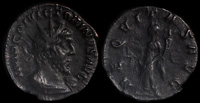Aequitas
View All Tags
The symbolism of Aequitas is often associated with balance and equality. In Roman art and coinage, she is frequently depicted as a goddess holding scales in one hand, signifying the weighing of evidence and the impartial evaluation of disputes. In her other hand, she often carries a cornucopia, symbolizing abundance and the prosperity that fairness can bring to society. This imagery underscores the idea that justice and equity are foundational to social and economic well-being.
Aequitas played a vital role in Roman law and governance, reflecting the Romans’ commitment to fairness and accountability in their legal system. The concept was closely tied to the praetors, officials responsible for administering justice, and influenced the development of Roman legal principles that emphasized equitable treatment for all citizens. In a broader sense, Aequitas was also linked to moral conduct, urging individuals to act with fairness and integrity in personal relationships and public life.
In a symbolic sense, Aequitas represents the Roman ideal of balance in all aspects of life—between rich and poor, powerful and weak, and individual and community. Her presence on Roman coins and monuments served as a reminder of the importance of justice in sustaining the social order and ensuring the prosperity of the Roman state.
The enduring legacy of Aequitas can be seen in modern legal and ethical systems, where the principles of fairness, justice, and equity remain central. As a symbol, Aequitas continues to inspire the pursuit of a balanced and just society, reflecting the timeless value of impartiality and fairness in human affairs.

Septimius Severus 193-211 CE

Vabalathus 272 CE

Victorinus 269 CE

Volusian 251-253 CE
